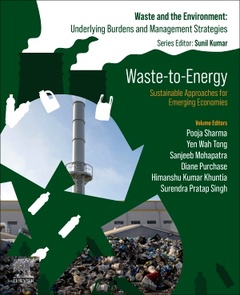Description
Waste-to-Energy
Sustainable Approaches for Emerging Economies
Waste And The Environment: Underlying Burdens And Management Strategies Series
Language: English
Subjects for Waste-to-Energy:
350 p. · 19x23.3 cm · Paperback
Description
/li>Contents
/li>Biography
/li>Comment
/li>
Waste-to-Energy: Sustainable Approaches for Emerging Economies presents the latest developments and applications for the conversion of waste into biofuels and other energy products. Divided into two parts, Section I reviews the major sources of solid waste and their management strategies in developing countries, and includes the collection, composition, segregation, and dispersal of various waste streams, as well as the generation of biogas and other value-added products. Section II examines the transformation of waste into biofuels and the management strategies required to efficiently implement waste-to-energy processes. Methods for the production of hydrogen, biomethane, biofuels, and bioenergy, as well as resource recovery are discussed in depth, and mathematical models are provided for anaerobic digestion techniques. The benefits and challenges of waste-to-energy as a waste management strategy are explored through dedicated chapters on the techno-economics, environmental and social regulation, the operation of WtE plants. The final chapter of the book presents a life cycle assessment and environmental impact analysis of the technologies and strategies discussed. Waste-to-Energy: Sustainable Approaches for Emerging Economies is a valuable reference for students and researchers interested in waste-to-energy, waste management, and biotechnology, and will be of interest to the wider environmental sciences and renewable energy communities.
1. Waste collection, composition, segregation, and dispersal: Current state of the art Value-added product formation from food waste
2. Anaerobic digestion of waste and generation of biogas
3. Generation of hydrogen and methane from waste
4. Biomethane production using co-additives from waste
5. Biochar adding anaerobic digestion of waste
6. Advancement in the technology and novel strategies for utilizing food waste
7. Generation of value-added products
8. Biofertilizer from food waste for agriculture sustainability
Section II: Waste transformation into biofuels
9. Anaerobic co-digestion improve major parameters impacting biofuel generation from food waste
10. Mathematical modeling of anaerobic digestion
11. Summary of developing sustainable waste to biofuel prospects
12. Production of solid waste and its use in bioenergy
13. Operational challenges during biofuel production from waste
14. Generation of hydrogen and methane from waste through biological routes
15. Contaminants of emerging concern and waste digestion
16. Thermochemical methods of solid waste treatment
??17. Treatment and resource recovery from solid waste via thermochemical catalytic reactions
Prof Yen Wah Tong is working in the Department of Chemical and Biomolecular Engineering at NUS since 2001, with research in biomimicry of living systems for medical and environmental applications. Since 2012, he has been the co-Programme Director of E2S2-CREATE, a major international research program with Shanghai Jiao Tong University, funded by the National Research Foundation, studying waste management in megacities. Prof Tong has published 237 papers in different National and International Journals and Books on various aspects of biofuel and microbiology covering her interests.
Dr. Sanjeeb Mohapatra, after fishing his Ph.D. degree at Environmental Science and Engineering Department, IIT Bombay, India, joined the National University of Singapore (NUS), Singapore, to pursue his postdoctoral research. His research interest broadly covers the monitoring of emerging contaminants (ECs), photo-degradation and enzymatic degradation of ECs, the role of dissolved organic matter in deciding the fate of such contaminants and the circular economy approach to solid waste and wastewater and sludge treatment/management.
Dr. Diane Purchase is a Professor of Environmental Biotechnology at Middlesex University, UK. She has over 25 years of experience in environmental biotechnology, exploring the role of microorganisms as part of nature-based solutions to address environmental challenges such as climate change. She is both a Fellow of the Royal Society of Biology and the Institution of Environmental Science
- Critically reviews the technologies and procedures for integrating waste management with energy production
- Evaluates and compares the various waste-to-energy technologies for their utility in producing biofuels
- Explores the use of waste-to-energy techniques for mass biotechnological processing of waste




